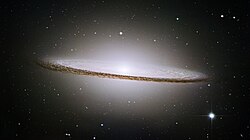File:Sombrero Galaxy in infrared light (Hubble Space Telescope and Spitzer Space Telescope).jpg

本预览的尺寸:800 × 448像素。 其他分辨率:320 × 179像素 | 640 × 359像素 | 1,024 × 574像素 | 1,280 × 717像素 | 3,000 × 1,681像素。
原始文件 (3,000 × 1,681像素,文件大小:3.98 MB,MIME类型:image/jpeg)
文件历史
点击某个日期/时间查看对应时刻的文件。
| 日期/时间 | 缩略图 | 大小 | 用户 | 备注 | |
|---|---|---|---|---|---|
| 当前 | 2009年7月20日 (一) 20:46 |  | 3,000 × 1,681(3.98 MB) | Tryphon | {{Information |Description=NASA/ESA Hubble Space Telescope and NASA's Spitzer Space Telescope joined forces to create this striking composite image of one of the most popular sights in the universe. Messier 104 is commonly known as the Sombrero galaxy bec |
文件用途
以下2个页面使用本文件:
全域文件用途
以下其他wiki使用此文件:
- ast.wikipedia.org上的用途
- az.wikipedia.org上的用途
- bs.wikipedia.org上的用途
- cs.wikipedia.org上的用途
- de.wikipedia.org上的用途
- en.wikipedia.org上的用途
- en.wikiquote.org上的用途
- en.wikiversity.org上的用途
- es.wikipedia.org上的用途
- fa.wikipedia.org上的用途
- frp.wikipedia.org上的用途
- fr.wikipedia.org上的用途
- he.wikipedia.org上的用途
- id.wikipedia.org上的用途
- it.wikibooks.org上的用途
- kk.wikipedia.org上的用途
- kn.wikipedia.org上的用途
- mg.wikipedia.org上的用途
- pl.wikipedia.org上的用途
- pt.wikipedia.org上的用途
- simple.wikipedia.org上的用途
- sk.wikipedia.org上的用途
查看此文件的更多全域用途。


